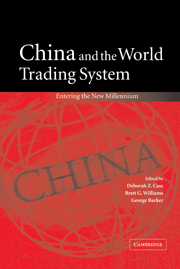Book contents
- Frontmatter
- Contents
- List of figures
- List of tables
- List of contributors
- Preface
- Acknowledgements
- Abbreviations and acronyms
- Introduction: China and the reshaping of the World Trade Organization
- PART I The world trading system
- PART II The accession
- PART III China – the domestic sphere
- 6 The state of the Chinese economy – structural changes, impacts and implications
- 7 Trade policy reform and China's WTO accession
- 8 China's WTO entry in labour surplus and Marxist terms
- 9 Enforcement of WTO agreements in China: illusion or reality?
- 10 China: trade, law and human rights
- PART IV Trade in goods
- PART V Trade in services and competition policy
- PART VI Intellectual property
- PART VII Dispute settlement
- Select bibliography
- Index
9 - Enforcement of WTO agreements in China: illusion or reality?
Published online by Cambridge University Press: 28 July 2009
- Frontmatter
- Contents
- List of figures
- List of tables
- List of contributors
- Preface
- Acknowledgements
- Abbreviations and acronyms
- Introduction: China and the reshaping of the World Trade Organization
- PART I The world trading system
- PART II The accession
- PART III China – the domestic sphere
- 6 The state of the Chinese economy – structural changes, impacts and implications
- 7 Trade policy reform and China's WTO accession
- 8 China's WTO entry in labour surplus and Marxist terms
- 9 Enforcement of WTO agreements in China: illusion or reality?
- 10 China: trade, law and human rights
- PART IV Trade in goods
- PART V Trade in services and competition policy
- PART VI Intellectual property
- PART VII Dispute settlement
- Select bibliography
- Index
Summary
Introduction
China's accession to the WTO has engaged considerable attention in trade and legal circles. Speculation has arisen concerning the potential benefits of membership to China and to her trading partners, and whether admitting China to the WTO will weaken the framework of what is, by many accounts, a most successful international organization. This chapter examines the theory and practice of implementing international treaties in China with a view to shedding light on the prospect of enforcing WTO agreements in China.
Since China adopted the open door policy in the late 1970s, it has participated in high-level trade negotiation and entered numerous trade and economic agreements, both at the bilateral and multilateral level. China's size and economic leverage in combination with MFN provisions of bilateral agreements have secured it the same trade treatment vis-à-vis the WTO as other Member States. At the multilateral level, despite its lack of membership of the WTO China has acceded to or participated in the making of multilateral trade treaties, the most significant of which was the Multi-Fibre Arrangement. As an observer, China was a participant in the Uruguay Round and initialled the final results of the negotiation.
Despite these trade advantages China has long desired entry into the WTO, and in July 1986 officially applied to the General Agreement on Tariffs and Trade (GATT), the WTO's predecessor, to resume its status as an original Contracting Party.
- Type
- Chapter
- Information
- China and the World Trading SystemEntering the New Millennium, pp. 132 - 155Publisher: Cambridge University PressPrint publication year: 2003
- 2
- Cited by



